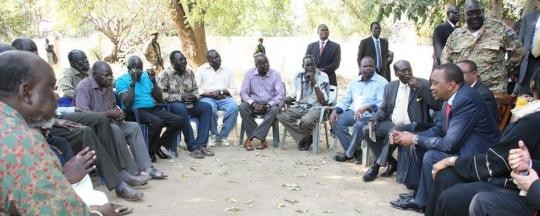The seven formerly detained SPLM leaders in Addis Ababa say they want political dialogue to help end the crisis in South Sudan and reach a comprehensive peace.
SPLM leaders Deng Alor, Gier Chuang, Kosti Manibe, John Luk, Cirino Hiteng, Madut Biar and Chol Tong – ‘the seven’ – were ordered detained by President Salva Kiir in December and held for more than a month before being released to Kenya.
They have since gone to Ethiopia where they are participating as a ‘third bloc’ at the political talks in Addis Ababa mediated by the East African regional bloc IGAD.
Although aligned with the ousted vice president Riek Machar before their detention, the six former ministers and one former governor after their released announced they would not join the main SPLM/A-in-Opposition faction led by Machar and former Unity State Governor Taban Deng.
In an interview broadcast on Radio Tamazuj on Friday, former Justice Minister John Luk claimed that his group is working tirelessly to bring about peace in South Sudan. “We believe in a holistic solution to the current political turmoil to iron out all the root causes of the political wrangling within the SPLM-led government,” he said.
“As leaders of the SPLM, we must sit down to dialogue, we don’t want to let the country we liberated to collapse,” he appealed.
No military role
While aspiring to play a major political role, the SPLM third bloc does not claim to control forces on the ground in South Sudan, and it appears not to have engaged directly with the other parties in the last few days of peace talks, which resumed Tuesday.
South Sudan’s government last week boycotted the opening of the talks, which were planned to start 20 March, because they strongly objected to the involvement of the Group of Seven in the talks.
In his remarks to Radio Tamazuj, John Luk confirmed being sidelined from parts of the talks, explaining that the group accepts it should not be involved in talks on military matters such as enforcement of the cessation of hostilities.
“During our consultations with the envoys we came to realize that the government delegation does not want our bloc to take part in the peace negotiations, especially in the political issues,” he explained.
“Our group has no links with the military issues, so it is those who took up arm against the government to discuss the security arrangements, therefore we are not going take part in it,” he said.
However, the South Sudanese politician noted they had already been given the draft of the agenda by the IGAD envoys, and emphasized that they should be involved in talks on political matters.
“We are an important party in the political dialogue as leaders of the Sudan People’s Liberation Movement and all the international bodies including IGAD mediation have acknowledged that,” says the politician.
The former minister revealed that the IGAD proposed to the three parties involved as well as civil society organizations to participate in the Declaration of Principles that deals with the issues of governance, democracy, rule of law, security and economic issues.
“We received the draft agenda from the envoys, we are going to meet later so that we analyse it thoroughly as a group, and then we will submit our opinion on it,” revealed the former detainee.
Accusations against Kiir
The member of the SPLM G7 has reaffirmed also the group’s support for the remaining four political detainees in Juba, including the detained SPLM secretary-general Pag’an Amum.
He accuses the president of setting up a kangaroo court to try the four, calling on the government to release them. “You know, the accusations against the four detainees being tried in Juba now were the same accusations labelled against us before, so they should be released also,” emphasized the G7 member.
“The number of the detainees are five including Professor Peter Adwok Nyaba who is under house arrest and his passport had been confiscated by the security – he is an important person in the negotiations,” he added.
John Luk pointed out their detention was politically motivated and had no link with the alleged coup d’état in Juba: “I can say that there was no coup at all, so the ongoing trial for the four comrades is because the president previously announced to the people that there was a coup in Juba, therefore he wants to prove that by trying the four political detainees.”
“Even in the court the prosecution is not able to get any single evidence of the alleged coup,” he explained, pointing out that the prosecution have used a press release by the group of SPLM leaders as evidence of intention to commit a coup.
“Even the flag that was being showed to the people is belonging to the United Salvation Front Party, which is a well-known party in the country,” says the former minister.
He called on the national justice minister to exercise the powers conferred upon him by the laws to cancel the accusations levelled against the detainees, rather than proceeding with the trial.
Government commits crimes
John Luk further accuses the government of Salva Kiir of targeted killings against the Nuer ethnic group in Juba.
“The reality is that the killings in Juba in mid-December were not between the Nuer and Dinka, it was the government targeting innocent Nuer citizens and politicians hailing from the same tribe without justifiable reasons,” the ex-minister stated.
“Now the citizens have lost confidence in the current government, that is why thousands of citizens preferred to shelter inside UNMISS bases across the country, and some of them crossed to the neighbouring countries,” he said.
Owing to this, the SPLM third bloc is calling for the formation of an interim government, said Luk, so as to restore confidence between the government and its citizens.
File photo: Ethiopian Prime Minister Hailemariam Desalegn and Kenyan President Uhuru Kenyatta meeting with the detained SPLM leaders in Juba, 26 December 2013 (BBC)




